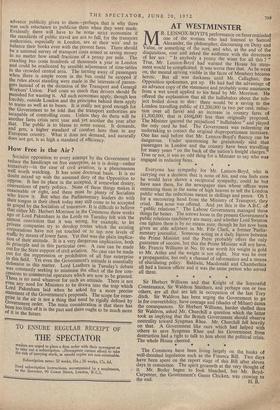AT WESTMINSTER
MR. LENNOX-BOYD'S performance on fares reminded one of the woman who had listened to Samuel Alexander, the philosopher, discoursing on Deity and Value, or something of the sort, and who, at the end of the disquisition, rose and asked the audience with the directness of her sex : " Is anybody a penny the wiser for all this ? " True, Mr. Lennox-Boyd had warned the House his state- ment would be complicated. It was worse than that. As he went on, the mental striving visible in the faces of Members became heroic. But all was darkness until Mr. Callaghan, the Opposition spokesman, got up. He had had the advantage of an advance copy of the statement and probably some assistance from a wet towel applied to his head by Mr. Morrison. Ho offered the explanation that all the hullabaloo about the sub- ject boiled down to this : there would be a saving to the London travelling public of £1,200,000 (a two per cent. reduc- tion over all fares) and an increase in country fares of £1,500,000, that is £66Q..000 less than originally proposed. The Minister ignored the prejudiced " hullabaloo " and played the only card he had. The Government was redeeming its undertaking to correct the original disproportionate increases. One has said before that Mr. Lennox-Boyd's fluency can be dangerous. Under questioning he gratuitously said that passengers in London and the country have been travelling for many years " on the back of the nation's freight charges.' True or not, it was an odd thing for a Minister to say who was engaged in reducing fares. * * * * Everyone has sympathy for Mr. Lennox-Boyd, who is carrying out a decision that is none of his, and one feels sure he would have shown a reciprocal sympathy, could he but have seen them, for the newspaper men whose offices were entreating them in the name of high heaven to tell the London public what the reductions meant in shillings and pence. Oh I; for a succouring hand from the Ministry of Transport, they cried. But none was offered. And yet this is the A.B.C. of " public relations." The Labour Government managed these things far better. The screws loose in the present Government's public relations machinery are many, and whether Lord Swinton can tighten them is by no means sure, though he has now been given an able adjutant in Mr. Fife Clark, a former 'Parlia- mentary journalist. Someone acting as a daily liaison between the Prime Minister and the Press probably offers the only guarantee of success, but this the Prime Minister will not have. Mr. Francis Williams at No. 10 was worth his weight in gold to Mr. Attlee and the weight is not slight. Nor was he ever a propagandist, but only a channel of information and a means , of elucidating policy. Baldwin, Macdonald and Chamberlain all had a liaison officer and it was the same person who served all three.
* * * * Sir Herbert Williams and that Knight of the Sorrowful Countenance, Sir Waldron Smithers, and perhaps one or two others, are all that are left in occupation of the last Tory ditch. Sir Waldron has been urging the Government to go in for convertibility, have courage and (shades of Milner) damn the consequences. Sir Herbert Williams, harder shelled than Sir Waldron, asked Mr. Churchill a question which the latter took as implying that the British Government should observe neutrality toward Syngman Rhee. Mr. Churchill fell heavily on that. A Government like ours which had helped with others to save Syngman Rhee and his Government from destruction had a right to talk to him about the political crisis. The whole House cheered. * * * ',0 The Commons have been living largely on the husks of well-threshed legislation such as the Finance Bill. Two days have been spent on the report stage of this Bill after eleven days in committee. The spirit groaneth at the very thought of it. Mr. Butler began to look bleached, but Mr. Boyd- Carpenter, the Government's Game Chicken, was crowing to the end. H. B.


















































 Previous page
Previous page